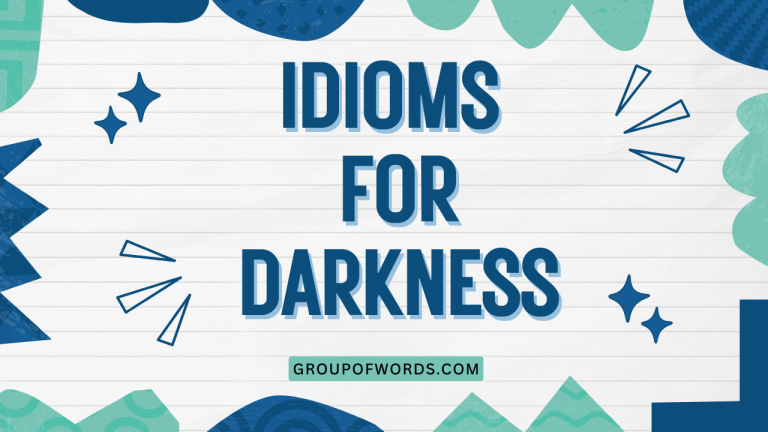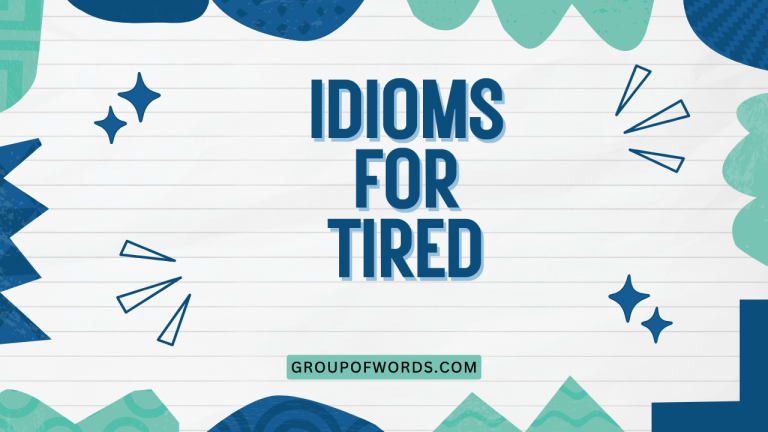Idioms for “Bad”: Mastering Nuance in English
Understanding idioms is crucial for mastering the nuances of the English language. Idioms, by their very nature, are expressions whose meanings cannot be deduced from the literal definitions of the individual words.
When it comes to describing something negative or “bad,” English offers a rich tapestry of idioms that add color, depth, and personality to communication. This article will delve into a wide array of idioms used to convey negativity, exploring their meanings, origins, and usage in various contexts.
Whether you’re an ESL learner aiming for fluency or a native speaker seeking to enrich your vocabulary, this guide will provide you with the knowledge and tools to effectively express disapproval, disappointment, or misfortune with linguistic flair.
This comprehensive guide will benefit ESL students, teachers, and anyone interested in enhancing their understanding of English idioms related to negativity. By exploring these idioms, learners can improve their comprehension of spoken and written English, communicate more effectively, and gain a deeper appreciation for the cultural richness embedded in the language.
Table of Contents
- Introduction
- Definition: Idioms for “Bad”
- Structural Breakdown of Idioms
- Types of Idioms for “Bad”
- Examples of Idioms for “Bad”
- Usage Rules for Idioms
- Common Mistakes with Idioms
- Practice Exercises
- Advanced Topics: Idiomatic Variation
- Frequently Asked Questions (FAQ)
- Conclusion
Definition: Idioms for “Bad”
Idioms for “bad” are expressions that convey a negative sentiment, indicating something is undesirable, unfavorable, or of poor quality. Unlike literal language, the meaning of an idiom cannot be determined by analyzing the individual words it comprises.
Instead, the idiom functions as a single unit of meaning, often reflecting cultural perspectives and historical contexts. These idioms are essential for understanding everyday conversations, literature, and media, as they add depth and color to communication.
Classification: Idioms for “bad” can be classified based on the type of negativity they express. Some describe poor quality, such as “gone to the dogs,” while others indicate bad luck, like “a recipe for disaster.” Still other describe bad behavior, like “out of line.”
Function: The primary function of these idioms is to express disapproval, disappointment, or a negative assessment of something. They allow speakers to convey their opinions or feelings in a more vivid and engaging manner than simple, literal language.
Contexts: Idioms for “bad” are used in a wide range of contexts, from informal conversations to formal writing. The specific idiom chosen will depend on the situation, the audience, and the desired level of formality. For instance, “a disaster waiting to happen” might be appropriate in a news report, while “a lemon” is more suitable for casual conversation.
Structural Breakdown of Idioms
Idioms, though seemingly simple, possess unique structural characteristics. Understanding these structures can help learners recognize and use idioms more effectively.
Fixed Expressions: Most idioms are fixed expressions, meaning the words cannot be changed or reordered without altering the meaning or rendering the idiom nonsensical. For example, you can’t say “gone to the cats” instead of “gone to the dogs.”
Figurative Language: Idioms rely heavily on figurative language, such as metaphors, similes, and hyperbole. “A can of worms” is a metaphor for a complicated and problematic situation.
Grammatical Structure: Idioms can take various grammatical forms, including:
- Phrases: A bad egg
- Clauses: To go to the dogs
- Sentences: That’s the last straw!
Variations: While most idioms are fixed, some allow for slight variations in tense or possessive pronouns. For example, “to have a bad day” can be inflected as “I had a bad day” or “She’s having a bad day.”
Types of Idioms for “Bad”
Idioms for “bad” can be categorized based on the specific type of negativity they convey. This categorization helps learners understand the nuances of each idiom and use them appropriately.
Idioms Describing Poor Quality
These idioms express that something is substandard, defective, or not up to par. Examples include “a lemon,” “gone to the dogs,” and “not worth a dime.”
Idioms Describing Bad Behavior
These idioms describe actions or conduct that is inappropriate, unethical, or offensive. Examples include “out of line,” “below the belt,” and “a slap in the face.”
Idioms Describing Bad Luck
These idioms express that someone is experiencing misfortune, adversity, or unfavorable circumstances. Examples include “a recipe for disaster,” “down on their luck,” and “when it rains, it pours.”
Idioms Describing Bad Health
These idioms describe a state of poor physical or mental well-being. Examples include “under the weather,” “feeling blue,” and “at death’s door.”
Idioms Describing Bad Situations
These idioms describe circumstances that are difficult, problematic, or undesirable. Examples include “in a pickle,” “between a rock and a hard place,” and “up the creek without a paddle.”
Examples of Idioms for “Bad”
This section provides extensive examples of idioms for “bad,” organized by category, to illustrate their usage in context.
Idioms Describing Poor Quality
The following table provides examples of idioms that describe poor quality, along with their meanings and example sentences. Recognizing these idioms will enhance your ability to assess the quality of goods, services, or performances accurately.
| Idiom | Meaning | Example Sentence |
|---|---|---|
| A lemon | A defective or unsatisfactory product, especially a car. | I bought a used car last week, but it turned out to be a lemon; it’s always breaking down. |
| Gone to the dogs | Deteriorated or declined in quality. | This restaurant has gone to the dogs since the new management took over. |
| Not worth a dime | Of very little value or worth. | His promises are not worth a dime; he never keeps them. |
| Cheap and nasty | Poor quality and inexpensive. | They sell cheap and nasty souvenirs at that tourist trap. |
| A rip-off | Something that is overpriced or not worth the cost. | That concert was a complete rip-off; the sound system was terrible. |
| Subpar | Below the expected standard or quality. | The service at the hotel was subpar; we had to wait an hour for our room. |
| Third-rate | Of very poor quality; inferior. | The play was third-rate; the acting was amateurish and the script was weak. |
| Second-rate | Of poor quality; not the best. | The hotel was second-rate, with uncomfortable beds and a noisy atmosphere. |
| Not up to scratch | Not good enough; below the required standard. | His work is simply not up to scratch and needs improvement. |
| Shoddy workmanship | Poorly made or done. | The house has a lot of shoddy workmanship; the paint is peeling and the floors are uneven. |
| A dud | Something that doesn’t work or is a failure. | The firework was a dud; it didn’t even light up. |
| A waste of money | Not worth the money spent. | Buying that gadget was a waste of money; it broke after only a week. |
| A bad job | A poorly done task. | They did a bad job painting the house; there are streaks everywhere. |
| A botched job | A task done very badly. | The surgery was a botched job; now he’s in worse condition than before. |
| Crummy | Of poor quality; run-down. | This is a crummy hotel, I wouldn’t recommend it. |
| Falling apart | In very bad condition. | My old car is falling apart; I need to get a new one soon. |
| In poor shape | In bad condition. | The building is in poor shape; it needs major renovations. |
| Tacky | In poor taste; cheap and gaudy. | The decorations were tacky, with too many bright colors and plastic ornaments. |
| Trashy | Of very poor quality; vulgar. | That magazine is trashy; it’s full of gossip and sensational stories. |
| Not worth the paper it’s written on | Worthless; unreliable. | That contract is not worth the paper it’s written on; the company is known for not honoring its agreements. |
| A dog’s breakfast | A mess; something done very badly. | The project was a dog’s breakfast; nothing was organized and the results were terrible. |
| Below par | Not good enough. | His performance in the game was below par; he missed several easy shots. |
| Not the best | Of poor quality; inferior. | That was not their best performance; the band seemed tired and uninspired. |
Idioms Describing Bad Behavior
The following table provides examples of idioms that describe bad behavior, along with their meanings and example sentences. These idioms are essential for expressing disapproval of someone’s actions and understanding social dynamics.
| Idiom | Meaning | Example Sentence |
|---|---|---|
| Out of line | Inappropriate or unacceptable behavior. | His comments were completely out of line; he shouldn’t have said such rude things. |
| Below the belt | Unfair or unsportsmanlike; hitting someone when they are vulnerable. | That insult was really below the belt; you know he’s sensitive about his weight. |
| A slap in the face | An insult or affront. | Denying her promotion was a slap in the face after all her hard work. |
| In bad taste | Offensive or inappropriate. | His joke about the tragedy was in bad taste; it offended many people. |
| Crossed the line | Exceeded the limits of acceptable behavior. | He crossed the line when he started yelling at his colleagues. |
| A bad egg | A dishonest or unreliable person. | He’s a bad egg; I wouldn’t trust him with anything. |
| A rotten apple | One bad person who can corrupt others in a group. | He’s a rotten apple and is influencing the other kids to misbehave. |
| A disgrace | A shameful or dishonorable act. | His behavior was a disgrace to the family name. |
| Unforgivable | So bad that it cannot be excused. | His betrayal was unforgivable; I can never trust him again. |
| A low blow | An unfair or unkind act. | Bringing up her past mistakes was a low blow; it wasn’t relevant to the current discussion. |
| A pain in the neck | Annoying or troublesome. | Dealing with that customer is a pain in the neck; he always complains about everything. |
| A thorn in one’s side | A constant source of annoyance or trouble. | That issue has been a thorn in my side for years; I can’t seem to resolve it. |
| Hard to stomach | Difficult to accept or tolerate. | His arrogance is hard to stomach; I can’t stand being around him. |
| Beyond the pale | Unacceptable; outrageous. | His comments were beyond the pale; they were completely inappropriate. |
| A nasty piece of work | An unpleasant or unkind person. | She’s a nasty piece of work; she always tries to undermine her colleagues. |
| Gone too far | Exceeded acceptable limits. | He’s gone too far this time; his actions are now illegal. |
| Playing dirty | Using unfair or dishonest methods. | They’re playing dirty in this negotiation; they’re not being honest about their intentions. |
| Stinking | Very bad or unpleasant. | That was a stinking thing to do; I can’t believe he lied to me. |
| Despicable | Worthy of contempt; vile. | His actions were despicable; he took advantage of vulnerable people. |
| Unscrupulous | Having or showing no moral principles; not honest or fair. | The company is unscrupulous; they exploit their workers and deceive their customers. |
| Out of order | Not acceptable or appropriate. | His behavior at the meeting was completely out of order; he was disrespectful and disruptive. |
| Someone you wouldn’t want to meet in a dark alley | A dangerous and untrustworthy person. | That guy is someone you wouldn’t want to meet in a dark alley; he has a reputation for violence. |
Idioms Describing Bad Luck
The following table provides examples of idioms that describe bad luck, along with their meanings and example sentences. Understanding these idioms allows you to express and comprehend situations involving misfortune or adversity.
| Idiom | Meaning | Example Sentence |
|---|---|---|
| A recipe for disaster | A situation likely to end badly. | Driving in this weather without snow tires is a recipe for disaster. |
| Down on their luck | Experiencing a period of misfortune. | After losing his job, he was down on his luck and struggling to make ends meet. |
| When it rains, it pours | When bad things happen, they tend to happen all at once. | First, I lost my job, and then my car broke down. When it rains, it pours. |
| Bad break | An unfortunate event or setback. | He had a bad break when he injured his knee and couldn’t play in the championship game. |
| Hard luck | Misfortune or bad luck. | “I didn’t get the job.” “Hard luck, but don’t give up.” |
| Out of the frying pan and into the fire | Going from a bad situation to a worse one. | I thought changing jobs would solve my problems, but I just went out of the frying pan and into the fire. |
| Born under a bad sign | Having a life filled with bad luck. | It seems like he was born under a bad sign; everything always goes wrong for him. |
| Jinxed | Under a curse or having bad luck. | I think this place is jinxed; nothing good ever happens here. |
| A stroke of bad luck | A single instance of bad luck. | Missing the train was just a stroke of bad luck; I’ll catch the next one. |
| Bad karma | Negative energy or consequences resulting from bad actions. | He must have bad karma; everything always goes wrong for him. |
| Tempered fate | A difficult or challenging destiny. | She has a tempered fate, but she is strong and will overcome her challenges. |
| Kiss of death | Something that ensures failure. | His endorsement was the kiss of death for the project. |
| The worst-case scenario | The most negative outcome that could happen. | The worst-case scenario is that we lose all our funding and have to shut down. |
| A black day | A day marked by tragedy or misfortune. | That day will always be remembered as a black day in the history of the company. |
| A run of bad luck | A period of experiencing misfortune. | He’s had a run of bad luck lately; he’s lost his job, his house, and his car. |
| In the wars | Having had a difficult or unlucky time. | He looks like he’s been in the wars; he’s tired, stressed, and overwhelmed. |
| Against all odds | Despite having very little chance of success. | Against all odds, they managed to win the game. |
| A bad omen | A sign that something bad is going to happen. | The broken mirror was a bad omen; something unfortunate is bound to occur. |
| On the rocks | In serious trouble or likely to fail. | Their relationship is on the rocks; they’re constantly arguing. |
| Walking under a ladder | Superstitious belief that this brings bad luck. | I would never walk under a ladder, I don’t want bad luck. |
Idioms Describing Bad Health
The following table provides examples of idioms that describe bad health, along with their meanings and example sentences. These idioms are useful for discussing health conditions in a nuanced and expressive way.
| Idiom | Meaning | Example Sentence |
|---|---|---|
| Under the weather | Slightly ill. | I’m feeling a bit under the weather today, so I’m going to stay home from work. |
| Feeling blue | Feeling sad or depressed. | She’s been feeling blue since her cat died. |
| At death’s door | Very ill and close to dying. | He was at death’s door after the surgery, but he’s slowly recovering. |
| Run down | Tired and in poor health, usually due to overwork or stress. | I’ve been feeling really run down lately; I need to take a vacation. |
| Not feeling oneself | Not feeling normal or healthy. | I’m not feeling myself today; I think I’m coming down with something. |
| As pale as a ghost | Looking very pale, usually due to illness or shock. | She was as pale as a ghost after hearing the bad news. |
| In bad shape | In poor physical condition. | He’s in bad shape after the accident; he has multiple broken bones. |
| On one’s last legs | Near the end of one’s life or usefulness. | The old man is on his last legs; he’s been ill for a long time. |
| Sick as a dog | Very ill. | I was sick as a dog after eating that bad sushi. |
| Blacking out | Losing consciousness temporarily. | I felt dizzy and started blacking out, so I sat down. |
| Croaking | Dying or in very bad health. | He was croaking with the flu and spent the entire week in bed. |
| On the mend | Recovering from illness. | I’m on the mend after my surgery and expect to be back to work soon. |
Idioms Describing Bad Situations
The following table provides examples of idioms that describe bad situations, along with their meanings and example sentences. These idioms are essential for expressing and understanding the complexities of challenging circumstances.
| Idiom | Meaning | Example Sentence |
|---|---|---|
| In a pickle | In a difficult or awkward situation. | I’m in a pickle; I forgot my wallet at home and I need to pay for lunch. |
| Between a rock and a hard place | Faced with two equally difficult choices. | I’m between a rock and a hard place; if I quit my job, I won’t have any money, but if I stay, I’ll be miserable. |
| Up the creek without a paddle | In a difficult situation without the means to solve it. | If we miss the deadline, we’ll be up the creek without a paddle. |
| A dead end | A situation with no hope of progress or success. | His career had reached a dead end; there were no opportunities for advancement. |
| A losing battle | A struggle that is likely to fail. | Trying to convince him to change his mind is a losing battle; he’s too stubborn. |
| A slippery slope | A course of action that seems harmless at first but can lead to serious consequences. | Legalizing marijuana could be a slippery slope; it might lead to the legalization of other drugs. |
| A vicious cycle | A series of events that reinforce each other, leading to a negative outcome. | Poverty and lack of education create a vicious cycle that is difficult to break. |
| A can of worms | A complex and problematic situation. | Opening up that investigation would be like opening a can of worms; there’s no telling what we’ll find. |
| A hornet’s nest | A situation that is likely to cause trouble or anger. | Criticizing his work is like stirring up a hornet’s nest; he gets very defensive. |
| A tight spot | A difficult situation. | We’re in a tight spot financially; we need to cut our expenses. |
| A crisis | A time of intense difficulty or danger. | The company is facing a crisis; sales are down and they’re losing money. |
| In hot water | In trouble. | He’s in hot water with his boss after missing the deadline. |
| In a bind | In a difficult situation. | I’m in a bind; I promised to help two people at the same time. |
| Between the devil and the deep blue sea | Facing two equally unpleasant choices. | I’m between the devil and the deep blue sea; if I tell the truth, I’ll get in trouble, but if I lie, I’ll feel guilty. |
| A Catch-22 | A paradoxical situation where someone is trapped by contradictory rules. | It’s a Catch-22; I need experience to get the job, but I can’t get experience without the job. |
| A mess | A confused or difficult situation. | The whole project is a mess; nothing is organized and nobody knows what they’re doing. |
| A quagmire | A difficult or entrapping situation. | The war has become a quagmire; we can’t seem to make any progress. |
| A stalemate | A situation in which neither side can win. | The negotiations have reached a stalemate; neither side is willing to compromise. |
| In dire straits | In a very difficult or dangerous situation. | The refugees are in dire straits; they have no food, water, or shelter. |
| In the soup | In trouble. | He is in the soup because he was caught cheating. |
Usage Rules for Idioms
Using idioms correctly requires careful attention to context, tone, and audience. Here are some key usage rules to keep in mind.
Context: Always consider the context in which you are using an idiom. Some idioms are appropriate for informal conversations but not for formal writing.
Tone: Be mindful of the tone conveyed by the idiom. Some idioms are humorous, while others are serious or sarcastic.
Audience: Consider your audience when using idioms. Some idioms may not be familiar to non-native speakers or people from different cultural backgrounds.
Grammatical Structure: Pay attention to the grammatical structure of the idiom. Most idioms are fixed expressions and cannot be altered without changing their meaning.
Overuse: Avoid overuse of idioms, as it can make your language sound unnatural or forced. Use idioms sparingly and only when they add value to your communication.
Literal vs. Figurative: Be aware of the difference between the literal and figurative meanings of an idiom. Using an idiom literally can lead to confusion or misunderstanding.
Regional Variations: Be aware that some idioms have regional variations. An idiom that is common in one part of the world may be unfamiliar in another.
Common Mistakes with Idioms
Learners often make mistakes when using idioms due to their non-literal nature. Here are some common errors to avoid.
Literal Interpretation: Interpreting an idiom literally instead of figuratively.
* Incorrect: “He was really under the weather, standing directly below the rain.”
* Correct: “He was really under the weather, so he stayed home from work.”
Incorrect Word Choice: Substituting words within an idiom, changing its meaning.
* Incorrect: “She’s feeling green.”
* Correct: “She’s feeling blue.”
Misunderstanding Context: Using an idiom in an inappropriate context.
* Incorrect: (At a formal business meeting) “The project is a can of worms.”
* Correct: (In a casual conversation about a project) “The project is a can of worms.”
Overusing Idioms: Using too many idioms in a short span, making the language sound unnatural.
* Incorrect: “I’m feeling blue, down on my luck, and up the creek without a paddle.”
* Correct: “I’m feeling quite down lately.”
Ignoring Audience: Using idioms that your audience may not understand.
* Incorrect: (Speaking to a beginner ESL student) “It’s a piece of cake.”
* Correct: (Speaking to a beginner ESL student) “It’s very easy.”
Practice Exercises
Test your understanding of idioms for “bad” with these practice exercises.
Exercise 1: Matching
Match the idiom with its correct meaning.
| Idiom | Meaning |
|---|---|
| 1. A lemon | A. In a difficult situation without the means to solve it. |
| 2. Out of line | B. A defective product. |
| 3. Down on their luck | C. Inappropriate behavior. |
| 4. Under the weather | D. Experiencing misfortune. |
| 5. Up the creek without a paddle | E. Slightly ill. |
Answers: 1-B, 2-C, 3-D, 4-E, 5-A
Exercise 2: Fill in the Blanks
Complete the sentences with the correct idiom from the list: a can of worms, a recipe for disaster, below the belt, gone to the dogs, not worth a dime.
- Driving without headlights at night is __________.
- That restaurant has __________ since the new chef arrived.
- Bringing up his past mistakes was __________.
- His promises are __________.
- Investigating this could open __________.
Answers: 1. a recipe for disaster, 2. gone to the dogs, 3. below the belt, 4. not worth a dime, 5. a can of worms
Exercise 3: Multiple Choice
Choose the correct idiom to complete each sentence.
- He’s been (feeling blue / under the table) since his girlfriend broke up with him.
- The project is (in a bind / a mess); nothing is organized.
- That joke was (in bad taste / out of fashion); it offended many people.
- I’m (between a rock and a hard place / in the soup); I have two equally difficult choices.
- The company is (in dire straits / feeling blue); they are losing money.
Answers: 1. feeling blue, 2. a mess, 3. in bad taste, 4. between a rock and a hard place, 5. in dire straits
Exercise 4: Sentence Completion
Complete the following sentences using an appropriate idiom from the article.
- After the heavy rains and subsequent flooding, the town was truly ____________.
- Telling your boss that he’s incompetent is definitely ____________.
- Ever since the factory closed, the town has ____________.
- Trying to argue with him is ____________, he never listens!
- My old laptop is ____________, I think it’s time I bought a new one.
Answers 1. in dire straits, 2. out of line, 3. gone to the dogs, 4. a losing battle, 5. falling apart.
Exercise 5: True or False
Decide whether the following statements are True or False, based on your understanding of the idioms.
- If someone is “under the weather,” they are feeling perfectly fine. (True / False)
- If a situation is “a recipe for disaster,” it is likely to end well. (True / False)
- If someone is described as “a bad egg,” they are generally considered trustworthy. (True / False)
- If something is described as “a lemon,” it is of high quality and works perfectly. (True / False)
- If someone is “between a rock and a hard place,” they are in a comfortable and desirable situation. (True / False)
Answers: 1. False, 2. False, 3. False, 4. False, 5. False
Advanced Topics: Idiomatic Variation
While most idioms are fixed expressions, some allow for slight variations in word order or grammatical structure. These variations can add nuance and flexibility to your language
.
For example, you might hear “He’s down on his luck” or “She’s been down on her luck lately.” The core meaning remains the same, but the slight change in wording allows for a more personalized expression.
Tense and Verb Form: Many idioms can be adapted to fit different tenses or verb forms. For instance, “to go to the dogs” can be used as “It has gone to the dogs” or “It is going to the dogs.”
Pronoun Variation: Idioms involving personal pronouns can be adjusted to reflect the speaker or subject. For example, “a thorn in my side” can become “a thorn in his side” or “a thorn in her side.”
Adjective Modification: Some idioms allow for the addition of adjectives to further specify the meaning. For example, instead of just saying “a mess,” you could say “a complete mess” or “an utter mess.”
However, it’s crucial to exercise caution when varying idioms. Incorrect modifications can render the idiom nonsensical or change its meaning entirely.
When in doubt, it’s best to stick to the standard form of the idiom.
Frequently Asked Questions (FAQ)
Why is it important to learn idioms?
Learning idioms is essential for understanding native speakers and comprehending the nuances of the English language. Idioms add color, depth, and personality to communication, making it more engaging and effective.
How can I learn idioms more effectively?
Immerse yourself in the language through reading, listening, and speaking. Pay attention to how idioms are used in context and practice using them in your own conversations and writing.
Are idioms the same in all English-speaking countries?
No, idioms can vary significantly between different English-speaking countries and regions. Be aware of these regional variations and use idioms that are appropriate for your audience.
Can I create my own idioms?
While it’s technically possible to create your own idioms, they are unlikely to be widely understood or accepted. Idioms typically evolve organically over time and become ingrained in the language through repeated use.
What is the best way to avoid misusing idioms?
Pay close attention to the context, tone, and audience when using idioms. If you’re unsure about the meaning or usage of an idiom, it’s best to err on the side of caution and use a more literal expression.
How do I know if an expression is an idiom?
If the expression doesn’t make sense when you interpret it literally, it’s likely an idiom. Also, idioms are often used in a figurative or metaphorical way.
Are there any online resources to help me learn idioms?
Yes, there are many online resources available, including dictionaries, websites, and language learning apps that focus specifically on idioms. These resources can provide definitions, examples, and practice exercises to help you master idioms.
Conclusion
Mastering idioms for “bad” is a significant step towards achieving fluency and a deeper understanding of the English language. By familiarizing yourself with the various types of idioms, their meanings, and their usage rules, you can effectively express negativity in a nuanced and engaging manner.
Remember to pay attention to context, tone, and audience, and avoid common mistakes such as literal interpretation and overuse. With consistent practice and immersion in the language, you can confidently incorporate these idioms into your everyday communication and elevate your English language skills to new heights.
Keep exploring, keep practicing, and embrace the richness and complexity of the English language!






